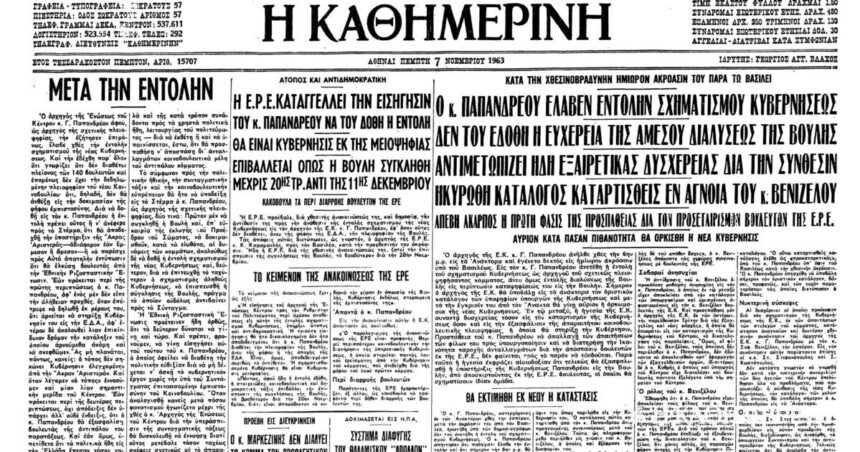In November 1963, to the already turbulent political climate of that year, after the election of November 3, the assignment of the prime ministership to George Papandreou by King Paul was to be added. For the first time after eleven years of dominance of the conservative space (with the Hellenic Alarm of Alexandros Papagos and the ERE of Konstantinos Karamanlis), a government was coming that was part of the Center.
However, the omens were anything but good for this government. The main problem presented was the lack of intra-party unity and specifically the rivalry between the leader of the Center Union, Georgios Papandreou, and the powerful factor of the party, Sophocles Venizelos. After all, the internal party crisis had erupted sharply with the single vote of tolerance by S. Venizelos in the Pipinelis government – the compromise solution found after the resignation of Constantinos Karamanlis in July – before the elections were held.
More broadly, the problem lay in the lack of consensus on the party’s political strategy. G. Papandreou envisioned voting for a proportional system and then holding elections by a caretaker government, while S. Venizelos supported the formation of a political and caretaker government at the same time, which would remain in power for many months with the aim of “de-partisanship” state. Of course, behind all this, there was also the unacknowledged targeting on the part of Venizelos, to weaken Papandreou, who seemed to prevail over him in the centrist space. It is worth noting that S. Venizelos maintained privileged relations with the Palaces and ultimately aimed at the formation of a political movement between the EPE and the E.K.
Indicative of the intra-party balance was the issue of the list of ministers. When G. Papandreou submitted to King Paul a list of the names of the possible ministers of the new government, without first consulting S. Venizelos, the latter’s reaction was immediate. As “Kathimerini” wrote on November 7: “According to relevant information, Mr. Venizelos also conveyed indirectly to Mr. Papandreou that if he does not ask for his consent for the list of Government ministers, he will refrain from all attempt to co-operate ERE MPs to ensure the necessary majority in the Parliament. »[…] It was considered that Mr. Papandreou had excluded the friends of Mr. Venizelos for the purpose of keeping certain ministries unfilled in order to use them “in return for the purchase of the expulsion of ERE MPs”. In this way, Mr. Papandreou sought to neutralize the justification of Mr. Venizelos, that he alone, as a vote of tolerance for the Pipineli Government, is in a position to negotiate after the ERE to send a group of its deputies to ensure its viability Government of Papandreou”.
Thus, the need to join the government of ERE deputies (since the Center Union did not have an autonomous majority), which seemed to be able to be satisfied only by Sophocles Venizelos, obliged G. Papandreou to once again lead the country to elections – not for the implementation of some government program, but to protect himself from his intra-party rival.
This treaty determined the developments. Dependent on the support of the Crown, G. Papandreou appointed General E.A. as Minister of National Defense. D. Papanikolopoulos, the perceived “watcher of the Palaces” and in December effectively gave the army control of the Palaces in exchange for the dissolution of the Parliament – which had to be done immediately to protect himself from Venizelos.
Thus, now responding to the needs of yet another pre-election period, the government of George Papandreou proceeded with a number of pre-election benefits for the satisfaction of broad groups of the population, such as farmers, public and private sector employees, students, etc.
As expected, the Center Union under George Papandreou triumphed in the elections of February 1964. However, the emerging Greek Center Left was born with great problems. It did not lack leading figures – there were George Papandreou, Sofocles Venizelos, Konstantinos Mitsotakis, George Mavros and others. Its main shortcoming was its loose intra-party unity, while its identity was not created around a solid ideological body and a fundamental and coherent goal setting for the governance of the country, but around the emotionally charged management of stereotypes of the past and specifically the National Divide, which made her particularly vulnerable.




